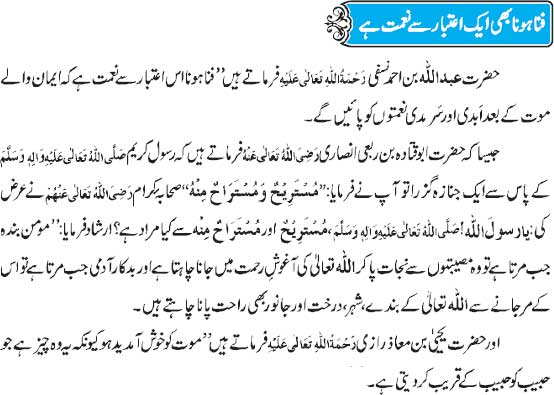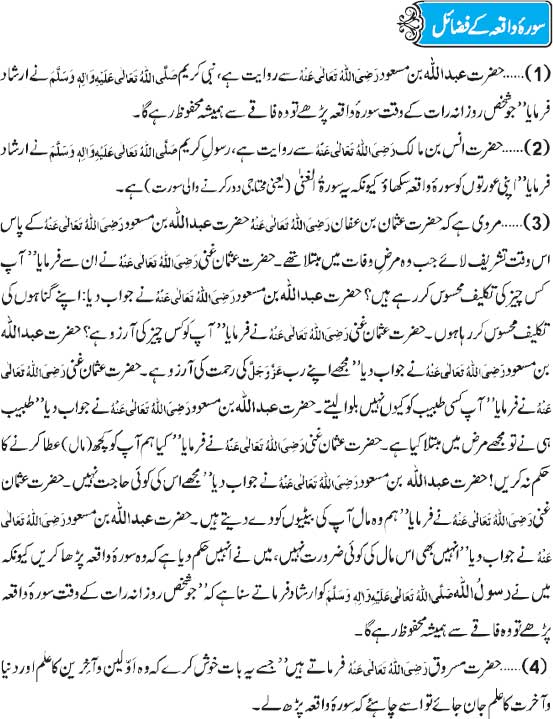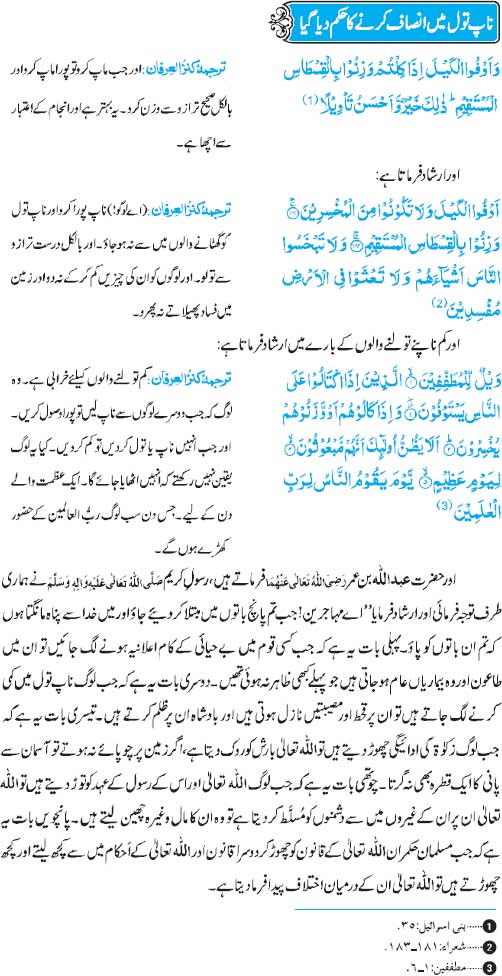
Fana Hona Bhi Naimat Hai
Errors During Umrah
Recently in Makkah, an old lady came for Umrah wearing the Ihram of men, the two white pieces of cloth. A few women at the Haram (the Grand Mosque in Makkah) helped her cover her head and change her clothes. Millions of people come for Umrah and Haj from around the world, but many, like the lady above, are unaware of its Islamic rulings and rites.
Here are some common errors adapted from the above resource:
Meeqat point
Some pilgrims bypass the designated Meeqat point of lhram on their route without either being in the state of Ihram or entering into Ihram there, proceeding until they reach Jeddah or some other place at which they enter Ihram.
This is against the command of Allah’s Messenger (peace be on him). Every pilgrim should enter into Ihram at the designated Meeqat point in his route. If one did not pass through one of the five Meeqat points, he should enter into Ihram at a point that is nearest to it.
If someone bypassed, he must either go back to the Meeqat point in his route and enter into Ihram, or he must give an expiation by sacrificing a sheep in Makkah and feeding all its meat to the poor.
Tawaf
Starting the Tawaf at some point other than the site of the Black Stone, while it is obligatory to begin Tawaf from the Black Stone.
Doing one’s Tawaf inside the Hijr of lsma’il. The Hijr of Isma’il is a part of the Ka’bah which would then be left out of Tawaf. Such a Tawaf is invalid.
Doing Ramal (taking quick short steps) during all seven circuits while Ramal is to be done only during the first three of the “Tawaf of Arrival” (Tawaf Al-Qudum).
Struggling vehemently to kiss the Black Stone in this process and hitting or pushing people. Such acts, which are injurious to Muslims, are not permissible.
Touching the four corners of the Ka’bah or its walls. The Prophet (peace be upon him) did not touch any part of Ka’bah except the Black Stone and the Yemeni Corner.
Specifying supplications reserved for each circuit. The Prophet (peace be on him) did not specify any supplications except to say “Allahu Akbar” when he reached the Black Stone and, at the end of each circuit between the Yamani Corner and the Black Stone, he said: “Rabbana, atina’ fid-dunya hasanatan wa fil-akhirati hasana wa qina adhaban-nar.”
(Our Lord, give us good in this world and good in the Hereafter and save us from the punishment of the Fire.)
Raising voices above the voices of others; while following or leading a group during Tawaf and creating confusion among other worshippers.
Scuffling and wrestling to pray at the Station of lbrahim. This is contrary to the sunnah, besides causing harm to other pilgrims. It is sufficient to pray the two Raka’ah after completing Tawaf anywhere within the Sacred Mosque.
Sa’ee
When climbing upon Safa and Marwah, some pilgrims face the Ka’bah and raise their hands towards it while saying “Allahu Akbar”. The Prophet (peace be upon him) did not do so.
Here you may glorify and magnify Allah in any words you wish while facing the direction of the Ka’bah. It is preferable, however, to say what the Prophet (peace be on him) recited at Safa and Marwah.
Azan Kay Ahkam


Azan Kay Ahkam
Nature, Too, Praises Allah
{As for the unbelievers, their deeds are like a mirage in the desert that the thirsty traveler supposes to be water, but when he comes near to it finds that it is nothing. But he finds that Allah (has always been present) with him, and that He will pay him his account in full; for Allah is swift in reckoning.
Or else, like the depths of darkness in a vast deep ocean, made yet more dark by wave billowing over the wave, with clouds above it all: Depths of darkness, layer upon layer, (so that) when one holds up his hand, he can hardly see it. Indeed, those from whom Allah withholds light will find no light at all.
Are you not aware that it is Allah Whose limitless glory all creatures that are in the heavens and earth extol, even the birds as they spread out their wings? Each of them knows how to pray to Him and glorify Him, and Allah has full knowledge of all that they do.
To Allah belongs the dominion over the heavens and the earth, and to Allah will all return.} (An-Nur 24:39-42)
The first two verses paint two scenes that are full of life, describing the situation the unbelievers find themselves in. The first of these two scenes highlights the surprise faced by the unbelievers when Allah gives them their account. It is a much greater surprise than that of a desert traveler being deluded by a mirage and then finding it to be nothing.
In the second scene, layers of darkness gather on top of one another, which stands in contrast to the false brightness of the mirage. The great fear is transmitted by the bottomless ocean engulfed in darkness and by the waves upon waves moving in a never-ending motion. Above all these, dark clouds gather. Thus, layers of darkness amass, to the extent that if someone holds out his or her hand, he or she fails to see it in the engulfing darkness that spreads an air of fear and panic.
This is all a description of unbelief, which is shown as darkness totally isolated from the divine light that radiates throughout the universe, a deep error that prevents people from seeing even the nearest signs of guidance, a fear that leaves no trace of security. For, {Indeed, those from whom Allah withholds light will find no light at all.}
Allah’s light is guidance planted in people’s hearts, giving them an informed insight and a bond between human nature and the laws that operate in the universe at large. It is the only true enlightenment. People who are cut off from this light remain in the darkness that cannot be removed, in fear with no security, and in error without return. In the end, they find all their actions to be a mirage leading them to ruin. No action is valid unless based on faith, no guidance without faith, and no light unless Allah’s.
No one should turn anywhere other than to God, and no refuge is to be sought except with Him. Meeting Him is inevitable.
This is the scene of unbelief, error, and darkness in human life. The scene of faith, guidance and light in the great universe follows it. It is a scene showing the entire universe with all that live in it, humans and Jinn, planets and stars, and all beings, whether animate or inanimate, sharing in Allah’s glorification. We feel how awesome the scene is as we hear the glorification echoing everywhere in the heavens and the earth.
{Are you not aware that it is Allah whose limitless glory all creatures that are in the heavens and earth extol, even the birds as they spread out their wings? Each of them knows how to pray to Him and to glorify Him; and Allah has full knowledge of all that they do. To Allah belongs the dominion over the heavens and the earth, and to Allah will all return.} (An-Nur 24:41-42)
Humans do not live alone in this universe. All around them, to their right and to their left, above them and underneath them, and in the expanse beyond, whether reached by their imagination or not, there are beings Allah has created with different natures, forms, and shapes. All of them share in their belief in Allah, turn to Him, and extol His praises. He {has full knowledge of all that they do.}
The Qur’an directs humans to look around them: All is of Allah’s making and all living things everywhere in the heavens and earth are His creatures, glorifying Him, and singing His praises. The Qur’an also directs our full attention to something we see every day without stirring any feeling in us because of its familiarity: It is the scene of birds lifting up their legs and spreading out their wings as they fly. They also glorify Allah. {Each of them knows how to pray to Him and to glorify Him..} Only humans neglect to glorify their Lord when He is the one Who should be most aware of the importance of believing in Allah and glorifying Him.
In this scene, the whole universe appears full of humility as it turns to its Creator, singing His praises and addressing its prayers to Him. It does this by nature. Its obedience to Allah is represented in its laws, which operate by Allah’s will.
When humans refine their senses, they see this scene as reality, as though they hear the rhythm of Allah’s glorification echo throughout the universe. They share with all creatures their prayers and appeals to Allah.
Such was Muhammad, Allah’s Messenger (peace and blessings be upon him): When he walked, he heard the gravel under his feet singing Allah’s praises. Such was David (Dawud): When he chanted his Psalms, the mountains and the birds chanted with him.
To Allah belongs the dominion over the heavens and the earth, and to Allah will all return.} No one should turn anywhere other than to Him, and no refuge is to be sought except with Him. Meeting Him is inevitable. His punishment, if deserved, cannot be averted except through His grace. To Him, all will return.
By Sayed Qutb
Muslim Intellectual — Egypt
Surah Al Waqiah Kay Fazail

Surah Al Waqiah Kay Fazail
What Are Your Subhan Allah Moments?
I don’t know about you, but life can be a real roller coaster. Some days, I wake up and think, “This is going to be a good day, Insha Allah.” The kids are listening without talking back, the food tastes particularly good, people seem unusually positive and supportive, time for worship is plentiful and beneficial, and life is good. Then, the downward spiral of the roller coaster begins. Suddenly the storm clouds come out and crisis sets in.
Allah challenges the believers in the Qur’an, asking: Do the people think that they will be left to say, “We believe,” without being put to the test? No, we have tested those before them… (Qur’an, 29:2-3)
Indeed, Allah has decreed for mankind a life of hardships and struggles, tests of one’s true faith and resolve. Each person feels their individual trial as intensely as the next person, and life can sometimes feel overwhelming.
Perhaps the test is in your relationship with your spouse, or even finding a spouse. Maybe obeying your parents or taking care of them in their old age brings on hardship. Of course, there can be problems at work, difficulty in finding work, financial instability, trials with parenthood, academic struggles, and health problems; the list of possibilities goes on and on. Sometimes, the trial is long and your patience grows thin. You begin to believe the trial will never end, that this will become your permanent living situation.
It is during these times that one most needs a “Subhan Allah” moment, a remembrance of purpose, and a refuge in the beauty of creation.
I wanted to share with you some of my “Subhan Allah” moments. These are moments I return to when I am feeling most distressed that help brings back balance and perspective to my situation. I encourage you to try to slowly read each of the following moments out loud, one by one, allowing each to enter your ears and travel to your heart. Close your eyes after each one and experience the sights, smells, and feelings of each moment until your tongue responds with the Dhikr of Allah.
- Embracing my child as he sits in my lap and softly explores my face with his tiny, roaming fingers.
- Listening to a new Muslim nervously struggling through their Shahadah for the first time in front of the entire mosque.
- Finally pondering a Qur’anic verse I have skimmed over numerous times and understanding it to the extent it brings tears to my eyes.
- Inhaling the wonderfully intense smell of brewing coffee on a cold winter day.
- Passing a grave site and thinking of the possible torture of its inhabitants.
- Feeling the first drops of water roll down my parched throat and fill my belly with cool relief after a long summer day of fasting.
- Reading a Hadith about the Prophet (peace be upon him) that exemplifies the beauty and compassion of Islamic manners, comforting me when I am feeling tested by the outside world.
- Listening to the Imam struggle through his recitation as his voice weighs heavy with tears and fear of the Hellfire.
- Finally getting confirmation of the first day of Ramadan, and anxiously calling my phone tree to spread the good news to friends and family.
- Being humbled by a new Muslim’s sincerity and struggle for the Religion that I take for granted.
- Staring at the dark night sky as a million stars dance around the crescent moon.
- Standing at Arafat during Haj with millions of believers from all over the world, mutually grieving from the fear of the Day of Judgment.
- Realizing the weight and immensity of Allah’s favor upon me when He guided me to the Truth.
The next time we are driven to the brink of insanity from the so-called realities of life, let’s seek refuge in the true realities, and say, Subhan Allah!
Muslimmatters
Adal Ki Zaroorat Aur Ahmiyat

Adal Ki Zaroorat Aur Ahmiyat
Miracle: Mi’raj
Whenever Allah sent a Nabee (Prophet), he provided various signs that proved that the Nabee was authentic in his claim. These signs took the forms of various unusual and wonderful feats being performed by the Nabee by the Will, Power, and Command of Allah. These signs are called mu’jizaat (miracles).
The miracles of the Prophets alayhimus salaam were of such unique nature that no one else was able to perform them, no matter how hard he tried, and he was thus rendered reluctant and helpless and had to admit that the Nabee in question is a Divine Messenger. The word mu’jizah literally means “that which renders powerless or helpless”, and a miracle of a Nabee is called mu’jizah because the feat performed by him cannot be emulated by anyone, and disbelievers are therefore left helpless.
Mu’jizaat of Muhammad (sallallahu alayhi wasallam)
The miracles of the previous Prophets alayhimus salaam were mainly of a practical nature and were limited to their lifetime only. The miracles of our Nabee sallallahu alayhi wasallam on the other hand were practical in nature as well as intellectual and some of them exist up to this day, well after his demise. Because Rasulullah sallallahu alayhi wasallam is superior amongst all the Prophets alayhimus salaam, similarly his miracles are also not only greater in number but are more superior.
Me’raj
One of the greatest and very well-known miracles of Rasulullah sallallahu alayhi wasallam is his ascension to the heavens and beyond, known as Me’raj (ascension). This journey apart from being a miracle is a conglomeration of miracles and has been recorded in the Qur’an as well as various books of Hadeeth.
Me’raj in Hadeeth
Haafiz Ibne Katheer rahmatullahi alayh has recorded the incident of Me’raj from twenty-five Sahaabah radhiyallahu anhum (Tafseer Ibne Katheer Vol. 3 Page 3)
The well-known muhaddith, Allaamah Zurqaani rahmatullahi alayh states that the incident of Me’raj is narrated by forty-five Sahaabah radhiyallahu anhum comprising of the Ansaar and the Muhaajireen.
One may ask as to how the Ansaar narrated this incident whilst it took place in Makkah before migration. The answer is that this event was so important and well-known amongst the Muslims that the Ansaar requested its details directly from Rasulullah sallallahu alayhi wasallam as is evident from a Hadeeth reported by Shaddaad Ibne Aws radhiyallahu anhu. He reports: We said, “O Messenger of Allah! How were you taken for a journey by night?” (Tirmizi)
The words “We said” also indicate that the conversation of Me’raj used to take place in the midst of a large gathering. Another Ansaari, Maalik Ibne Sa’sa’ah radhiyallahu anhu narrates the story of Me’raj in the following words:
“The Nabee sallallahu alayhi wasallam related to them ” (Bukhaari)
It is clear that the incident of Me’raj was well-known amongst the Sahaabah radhiyallahu anhum and is narrated in authentic Ahaadeeth.
Me’raj-Physical or Spiritual
The Me’raj of Rasulullah sallallahu alayhi wasallam was physical i.e. with body and soul. He ascended the seven heavens and proceeded beyond that to the Sidratul Muntahaa and further physically. In the mind of a mu’min (true believer), a doubt concerning the possibility of a physical ascent to the heavens does not occur. For a believer, this is a fact that requires no logical reasoning. What doubt can there be concerning Allah’s power to do as he wishes?
Nowadays with the advancement of modern technology, man is orbiting satellites and landing on the moon. If a man has advanced so much, is it not possible for the Creator of man to carry His Beloved Prophet sallallahu alayhi wasallam physically with body and soul into the heavens and back within a very limited part of the night? Of course, it is possible!
Me’raj was Physical
1. Glorified be He who carried His servant by night (Qur’an 17: 1)
This verse from the Qur’an describes the initial stages of the miraculous journey of our Beloved Nabee sallallahu alayhi wasallam. One can clearly ascertain from the words of this verse that the Me’raj was physical:
a. Allah ta’aalaa initiates the verse with the word ‘sub’haan’ which means glorified be He Whose Self is pure from all defects and frailties and is above all kinds of weakness and helplessness. He is not dependent upon any means and He is not bound by any physical laws. Those things which look extremely strange to our imagination and that our imperfect wisdom thinks as quite impossible are not a bit difficult before the Power and Will of Allah. Thus, from the very outset, the event of Me’raj has been described as extraordinary and the word sub’haan belies the misconception that the event was only a dream.
b. The journey of Rasulullah sallallahu alayhi wasallam is further expressed by the verb asraa which is used for a journey of body and soul in the state of consciousness by night. This same verb is used elsewhere in the Qur’an too. In Soorah Hood and Hijr, the instruction given to Prophet Loot alayhis salaam by the angles is: So take away your people in a part of the night (11: 81, 15:65). Similarly, Prophet Moosa alayhis salaam is ordered by Allah, Take away my slaves by night (44:23, 20:77). In both cases, the Prophets are ordered to take their people physically with body and soul and not spiritually in dream.
c. The word abd (servant) is used to mean either the body only or body and soul together. It is not used to mean soul only.
2. Another verse of the Qur’an regarding Me’raj is We appointed the vision which we showed thee as an ordeal for mankind (17:60) The word ru’yaa (vision) is used for two meanings: dream or vision/view/ sight. The commentators of the Qur’an have given examples from Arabic poetry where ru’yaa is used to mean vision/seeing and not dream. Imaam Bukhaari has narrated from Abdullah Ibne Abbaas radhiyallahu anhuma the meaning of the word ru’yaa in this verse with the following words: “It (the ru’yaa) was an actual eyewitness (account) which was shown to Rasulullah sallallahu alayhi wasallam the night he was taken on a journey (through the heavens)”. (Bukhaari Vol. 6 page 204)
3. It is an accepted fact that when one relates a story or an event but does not say that it was a dream, it is naturally taken as an incident of consciousness. The verse of the Qur’an describing the miraculous journey and the Ahaadeeth do not mention or indicate that it was a dream. Hence this incident will be considered physical in the state of awakening.
4. When the kuffaar (disbelievers) of Makkah heard the details of the incident of Me’raj, they rejected it. They jeered at the Muslims, made fun of Rasulullah sallallahu alayhi wasallam and called him a liar. They asked him to describe the masjid in Jerusalem, which he had never seen before. Had it been only a dream they would neither have mocked him nor asked for any evidence. Similarly, there was no reason for their rejection as people often dream of strange things. It is apparent that they were asking for further details knowing that the journey was physical. Rasulullah sallallahu alayhi wasallam too did not say that it was only a dream. Instead, he substantiated his physical journey with another miracle which is reported by Bukhaari and Muslim from Jaabir Ibne Abdullah radhiyallahu anhu that Rasulullah sallallahu alayhi wasallam said, “When the disbelievers of Makkah rejected my night journey to Baytul Maqdis and made queries about the details of Baytul Maqdis, I stood in the Hateem and Allah ta’aalaa opened the veils (between myself and) Baytul Maqdis. I was looking at it and informing them of the details they were asking for.
5. The incident of Me’raj has been listed amongst the miracles of Nabee sallallahu alayhi wasallam. What is so extraordinary about traveling such long distances in a mere dream?
This is sufficient to prove beyond a shadow of a doubt that Rasulullah sallallahu alayhi wasallam travelled from Makkah to Masjidul Aqsa and then ascended the heavens physically with body and soul in the state of awakening within a very limited part of the night.
Shaykh Muhammad Saleem Dhorat
Riyadul Jannah – Volume:3 Issue:2
Naap Tol Mein Insaf Ka Hukum

Naap Tol Mein Insaf Ka Hukum
Start With The Qur’an
The Prophet (peace and blessings be upon him) said in a hadith recorded in Al-Bukhari, related by `Uthman ibn `Affan: “Khayrukum (the best of you) is the one who ta`allam(learns) the Qur’an and teaches it.”
The word ta`allam is in a form that means takalluf (effort/exertion), meaning that the person struggled to learn the Qur’an, that their learning the Qur’an required effort and difficulty.
khayrukum means the best of the Muslims. This shows that the success, honor, respect, and glory of this ummah is with the book of Allah Almighty. That’s why I encourage our brothers and sisters who become Muslim, after learning prayer and other basics of Islam, they should focus on the Qur’an.
Find someone who can teach you the Qur’an. I meet Muslim brothers who tell me all the bad things about a particular scholar. I ask the brother if he can read Surat Al-Fatihah. I find that he cannot even read the Qur’an properly, but he was able to speak about a scholar of Islam.
What kind of Islam is this? When the Companions of the Prophet became Muslims, the first thing they concentrated on was Qur’an and how to pray..
Alhamdullilah (praise be to Allah), I thank my teacher in Oklahoma. He was a large man from Senegal. When I became Muslim he grabbed me and said, “Listen, learn the Qur’an and learn Arabic. Don’t waste your time with groups.” I remember he told me some stories about Senegal that I want to share with you.
First, he said: “In my town in Senegal (St. Louis, which is next to Mauritania) if someone amongst the people of knowledge wants to get married he must first memorize the Qur’an, pray Taraweeh with the Qur’an and also memorize the theMu’wattah of Imam Malik.” Of course, this is difficult for us today – we have difficulty memorizing the 40 Hadith of Imam Nawawi, but this criterion shows us the level of their study.
Then, my teacher told me that he finished learning the 10 major qira’h (recitations) of the Qur’an and he learned that from his sister. He said, “My father considered the Qur’an to be a simple pre-requisite that had to be done, and so he didn’t teach it to me. My father was busy teaching Usul Al-fiqh (philosophy of Islamic Law), Lughah (language), Hadith (traditions of the Prophet ), etc.
My father told me that for the examination to get the real ijaazah (certification) we would be given empty notebooks. Then we had to write from Surat Al-Fatihah to Surat An-Nas in two weeks. Every day you had to write a certain amount of Qur’an, which would then be given to the Sheikh. They read what you write and if you make even one mistake, you don’t get an Ijaazah. Just one mistake. I asked my teacher, “Where is the book in which you wrote the Qur’an?” He said, “No, we don’t keep it. It is a gift for our Sheikh.”
The third story he told me is about his grandfather who was the Mufti of Senegal. He said one day a group of youth came to his grandfather and told him they wanted to study the philosophy of Islamic Law. He said, “No.” They asked, “Why?” He asked them, “How much Qur’an have you memorized?” They replied, “We’ve memorized twelve Ajzaa’ (parts).” He said, “Start with Qur’an. Forget Usul Al-fiqh.”
The Qur’an is very important, and we should not neglect it. If you have the time and the resources of people available to teach you, then you will be asked by Allah Almighty why you didn’t study and make an effort to learn. One of my teachers, Sheikh Muhammed Al-Mahdi in Egypt, started to teach five subjects every day after Fajr. I stopped going to this class of his, and one day he came to me and said, “I’m going to bear witness against you on the Day of Judgment that you didn’t come to class.” Then, I started to come to class!
How many of us want to be the chosen people of Allah Almighty? The Prophet said,
“The people of the Qur’an are the people of Allah Almighty and His chosen people.”
By Suhaib Webb

